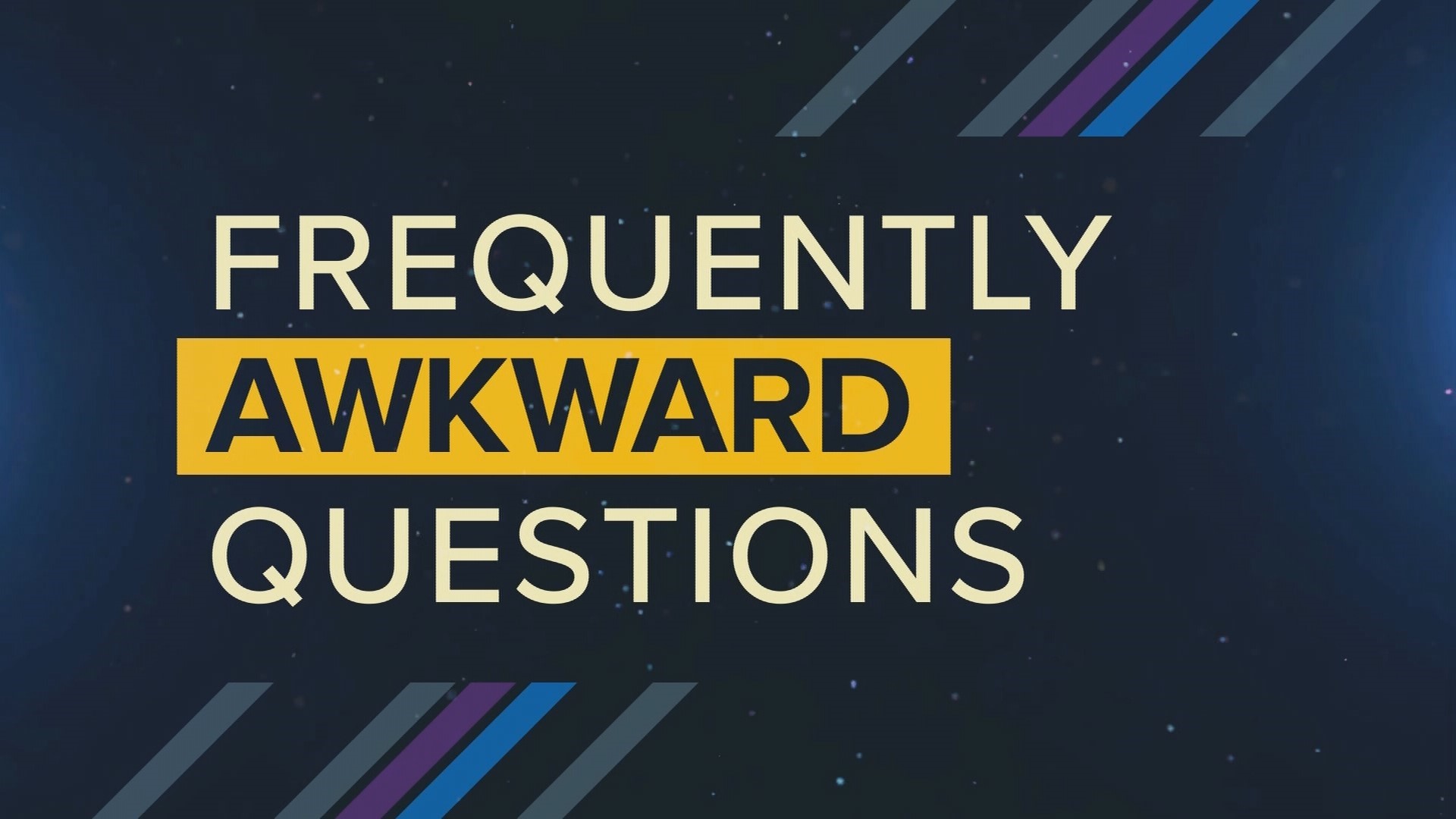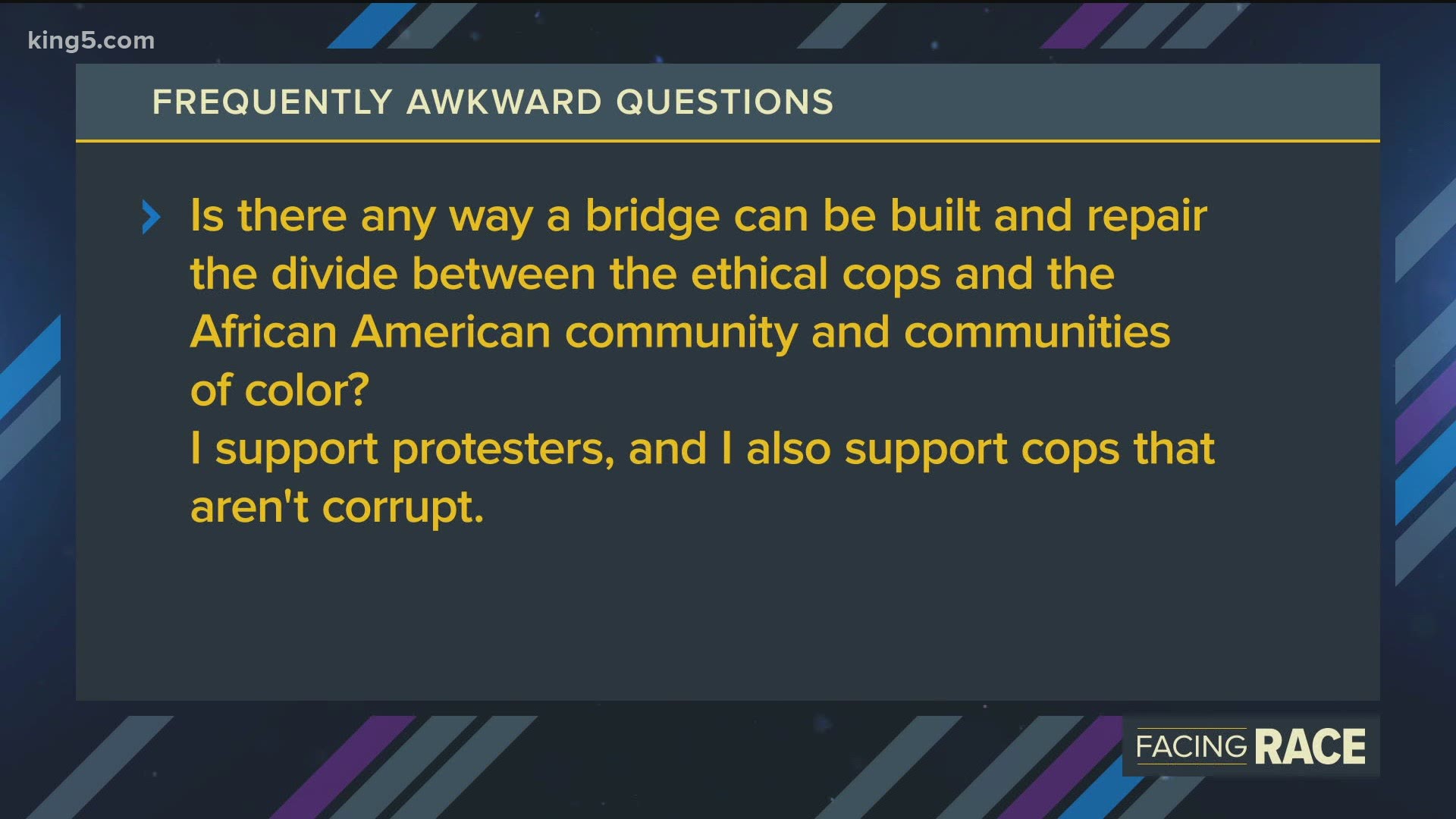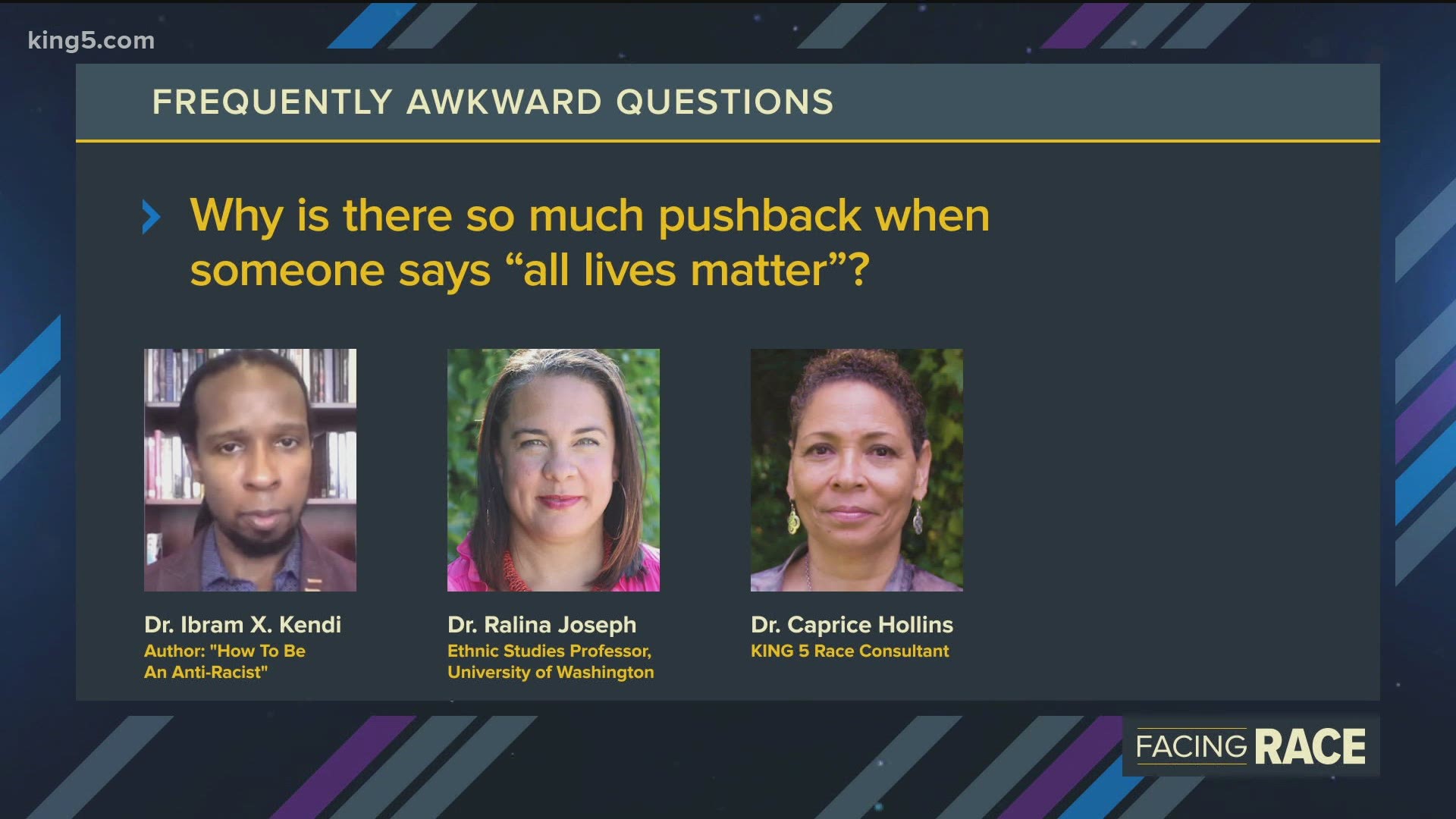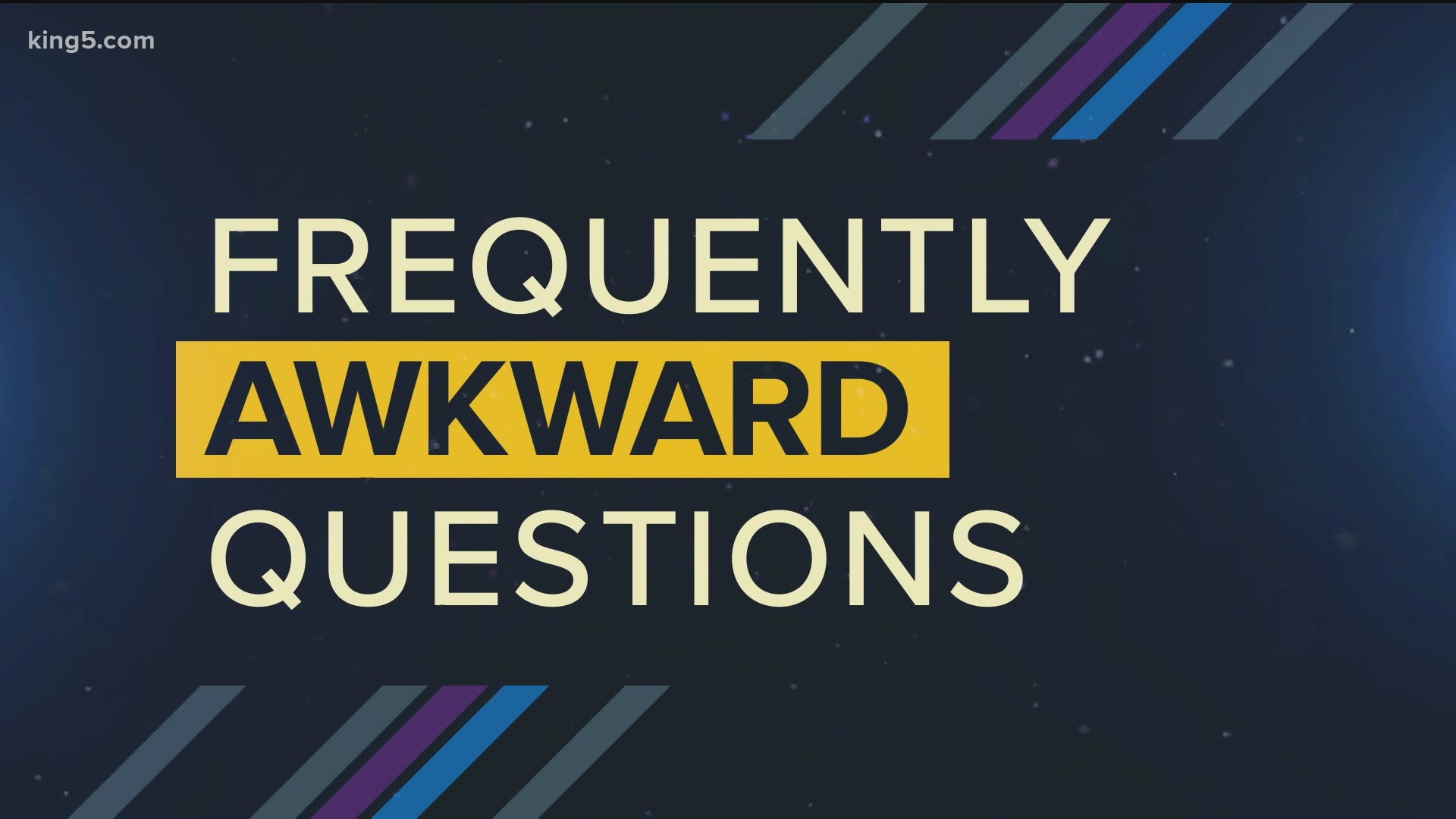FAQ: Your questions about race and racism answered
From handling tough conversations about race to the controversy around “All Lives Matter,” we answer your honest and frank questions about race.

Can people of color be racist? How can white people make reparations?
These are a few of the honest – and sometimes awkward – questions about race that you may want to know the answer to but were too embarrassed or scared to ask.
Race is a sensitive topic, so we’re answering your questions anonymously as part of the Frequently Awkward Questions segment on the KING 5 series “Facing Race.” If you want to ask a question, fill out this form. We will ask a panel of race experts for the answers.
Antiracism and being an ally
How do average white people who want to grow in regards to race relations make progress?
Race educators say it starts with personal work.
Dr. Caprice Hollins, co-founder of Cultures Connecting, urges white people to examine how they have been socialized about race and recognize their own biases and white privilege.
To identify your own bias, Hollins recommends noticing the times you are surprised and asking yourself why. For example, if you ask to see the manager and that person is black or in a wheelchair, and you’re surprised, ask yourself why.
Finally, Hollins says white people should own where they collude with racism, including ways they have been silent or didn't do anything to dismantle it.
“That’s one of the most important things white people can do because it takes them to a different place in the conversation,” Hollins said.
What can white people do to apologize or try to make amends to people of color?
While you can apologize to people who you were racist towards, race educators said the best way to apologize was through remunerations, such as supporting an organization that does racial justice work.
“I think that trying to think about the type of antiracist action that you could engage in in your own area, working on racism in your own family, in your own work circles – that’s a way of apologizing,” said Dr. Ralina Joseph, a professor of communication and ethnic studies at the University of Washington.
If there is someone who you personally hurt, you can try to make amends, but author Ibram Kendi warned not to put any expectations on it. That person may not want to hear your apology.
A final piece of advice from Joseph – don’t just walk up to a person of color and apologize.
“That would be very awkward,” Joseph said.
Can anyone – people of color included – be racist?
The short answer: depends who you ask.
Dr. Caprice Hollins, co-founder of Cultures Connecting and a race educator, says she’s in the camp that people of color cannot be racist, because systemic racism has an element of power by being tied to systems of oppression. However, she believes people of color can collude with racism.
“There are things that I can do that reinforce systems of oppression," Hollins said.
On the other hand, in his book, “How to Be An Antiracist,” historian Ibram Kendi argues anyone can exhibit racist thoughts if they believe in a hierarchy that says one racial group is better than another.
However, Kendi said the more important question to ask is whether someone is being antiracist, meaning they support policies that bring equality among racial groups.
“Are you recognizing that because there’s racial inequities there must be something wrong with bad policies as opposed to bad people?” Kendi said. “That should be the question. Are we being anti-racist whether the person is Black or Asian or Native or Latinx?”
Why do we need to talk about race when we should all worry about pulling together? Why does it have to be divided?
Robin DiAngelo, author of “White Fragility,” said this thinking is likely connected to the narrative that race is a divisive issue. However, she argued that Americans are already divided by race as seen by white nationalism and explicit racism.
“This is not a result of us talking about racism. This is a result, I think, of us not talking, like letting all of that simmer under the surface,” DiAngelo said.
DiAngelo also pointed to other social problems in the U.S. that often aren’t discussed, such as suicide, domestic violence or sexual assault, and asked if the best approach is to pull together and not talk about it.
“In any one of those cases, who is not served by not talking about the elephant that’s in the room?” DiAngelo said.
What are the best ways to identify biases we all have?
Race educator Caprice Hollins recommended noticing situations where you’re surprised and asking yourself why. For example, if you ask to speak to the manager or your child’s principal, and you’re surprised that person is in a wheelchair or is Black. Why does that surprise you?
Hollins said identifying those assumptions is the first step, but it doesn’t turn into bias until that impacts the decisions we make.
“That's the stereotype, right? You made assumptions,” Hollins said. “But then it becomes bias when you then treat them in a certain way. It could be negative or positive, because of the assumptions that you then hold about them.”
The non-profit Project Implicit, which was co-founded by a University of Washington researcher, also put together a test to examine unconscious thoughts and feelings you have on various topics and help identify bias.
Why can't I say that?
Why is it wrong to say that you’re colorblind or "I don’t see race?"
When someone says, “I don’t see color,” race educator Caprice Hollins says it’s not coming from a bad place. Hollins believes that person may be trying to say they’re not racist or they think we’re all the same but said that’s not how the comment comes off.
Instead, Hollins said colorblindness communicates a person doesn’t want to talk about race or even understand experiences that people of color have.
“So now you collude with racism by maintaining these systems that say we don’t need to pay attention to them or do anything to change them,” Hollins said. “Again, that’s not the intent, but that is the impact.”
Instead, author Ibram Kendi said we should be teaching our children to see beauty in human difference and value it.
“We shouldn’t be teaching our children to not see the very colors they can see on people’s faces,” Kendi said.
Why has the phrase “All Lives Matter” gotten so much pushback?
What’s the correct terminology – Black, African American or people of color?
When you’re talking about a broader group of people, race educator Caprice Hollins says using people of color or BIPOC, which stands for Black, Indigenous and people of color, is acceptable.
“It is a way to have a conversation to talk about a group's experience because of race,” Hollins said.
When you’re referencing a specific person, they may prefer the term Black or African American. However, Hollins said in her experience, Black people tend to use the term Black, and African American is oftentimes used by white people or in studies or research.
The bottom line: If you use one term, and that person is offended, Hollins encouraged people to learn from it.
“Just lean in and say, ‘Tell me why you prefer African American,’ and see what their preference is and refer to them in the way that they prefer to be identified,” Hollins said.
Why does the n-word seem perfectly ok for African Americans to use within their own group?
The short answer is this depends who you talk to.
“There's a lot of division, even in the Black community, about whether or not that word is appropriate,” said race educator Caprice Hollins.
To explain why it’s offensive for white people to use the n-word, Hollins used the example of discussing a person’s weight. As a self-described small woman, Hollins said she would never make a joke about someone being overweight, because she doesn’t understand the pain that comes with it.
“If a person is overweight and makes a joke about themselves…that's for them to do. And that's for them to question whether or not that's an okay thing to do,” Hollins said. “But as someone on the outside of that experience, I would never say anything about someone's weight.”
Interpersonal relationships
I have stopped talking to many relatives because of their racism. I love my parents dearly but in all honesty, they too are quite racist. What can I do or say that will have a positive influence on them, and is their hope that they will ever change?
Dr. Ralina Joseph, a professor of communication and ethnic studies at the University of Washington, urges people to not give up on their relatives. Keep having challenging conversations, because as Joseph says, you know your family best and ultimately know the best ways to communicate with them.
She also shared some tips for navigating those conversations:
- Keep your tone neutral
- Ask clarifying questions
- Share your experience but don’t turn it into an argument. Remember the conversation is about hearing each other.
When it comes to educating children, it's hard for them to understand culture versus physical differences. Is there a way to do this that maintains respect for culture?
Policing
Do people of color want me as a white person to stop and act as a witness when they are pulled over by police? I often feel like I should stop, but I don't want to assume or be nosy.
Is there any way a bridge can be built and repair the divide between the ethical cops and the African American community and communities of color? I support protesters, and I also support cops that aren't corrupt.
Yes, says Dr. Alexes Harris, a sociology professor at the University of Washington. There absolutely is a way to build a bridge between police and communities of color.
Harris says that bridge could come in two ways. First, Harris says we need to have conversations and learn from different communities to understand their experiences with police.
“For many people, the history of the criminal justice system, how it’s evolved out of slavery and control of Black bodies, that history is playing really, really loudly for a lot of people, particularly when we interact with police,” Harris said.
Second, Harris says the real key is through structural change that wipes out racial disparities in the criminal justice system.
Culture
Why do youth of color wear hoodies year-round? It makes me think they don't want anyone to be able to describe what they look like. I think to myself, 'That kid is up to no good,' and I become watchful of their every action.
In short, those youth are probably wearing hoodies because hoodies are warm and comfortable, says Sharonne Navas, executive director of the Equity in Education Coalition of Washington.
However, Navas said this question may point to deeper beliefs about race, including why we’re socialized to think certain kids in hoodies are trouble.
“If you're thinking, ‘What is that student, what is that youth up to? That youth is up to no good,' it's not the youth. It's you,” Navas said. “And I would think about why that's your first question, because when I see a white youth in a hoodie, it doesn't faze me at all.”
Is there a difference between race and ethnicity?
Although many people use race and ethnicity interchangeably, race educator Caprice Hollins says there is absolutely a difference between the two.
According to Hollins, race is more of a social construction and often has to do with skin color. For example, are you black, white or brown?
Ethnicity is about culture. Hollins pointed out that two people can share a race but have different cultures. For example, Africans and African Americans could both be described as black but are very different culturally.
This story was produced as part of “Facing Race,” a KING 5 series that examines racism, social justice and racial inequality in the Pacific Northwest. Tune in to KING 5 on Sundays at 9:30 p.m. to watch live and catch up on our coverage here.




